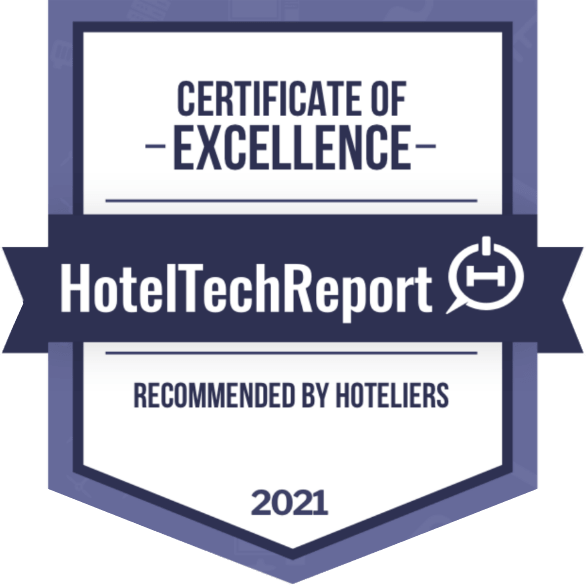Contents
Toggle1. Introduction: Your Hotel’s Reputation Never Sleeps. Are You Keeping Up?
Imagine this: A traveler is planning their next trip. They have dozens of hotel options, all with similar prices and amenities. What ultimately sways their decision? Your online reputation.
Today, a hotel’s digital presence is its most powerful marketing tool. Studies show that 90% of travelers read reviews before booking, and 79% won’t book a hotel with a significant number of negative reviews. Even a half-star difference in ratings can impact your revenue, as higher-rated hotels often secure more bookings at better rates.
The challenge? Your reputation never takes a break. A single negative review, if ignored, can damage your credibility. A slow response to guest feedback can make your hotel seem unresponsive. And with reviews scattered across platforms like TripAdvisor, Google, and OTAs, managing it all can feel overwhelming.
A well-managed reputation can:
- Increase direct bookings by showcasing trust and reliability.
- Boost guest loyalty, turning one-time visitors into repeat customers.
- Improve operational efficiency, helping you identify areas for improvement based on guest feedback.
In this post, we’ll break down common reputation management challenges, offer actionable strategies, and explore how innovative tools can help you take full control of your online presence.
For a deeper understanding of how digital presence impacts hotel operations, check out Everything You Need to Know About Hotel Operations Management.
2. The Importance of Online Reputation in Hospitality
Your hotel’s online reputation is a reflection of guest experiences and a key driver of revenue. In an industry where customer perception can make or break a business, having a strong reputation strategy is essential.
Why Does Online Reputation Matter?
A. Direct Impact on Bookings
- A study by TripAdvisor found that hotels with a 4-star rating or higher receive more bookings than those with lower ratings.
- 72% of guests will not book a hotel with negative guest reviews about cleanliness, customer service, or safety.
To explore how online reviews influence booking behaviors further, see our insights in How to Increase Direct Bookings for Hotels.
B. Trust & Brand Loyalty
- Consistently positive reviews build guest trust, leading to repeat stays.
- Responding to reviews (both positive and negative) increases guest engagement and demonstrates commitment to customer service.
C. Competitive Advantage
- With so many hotel options available, properties with well-managed reputations stand out.
- Positive online reviews allow hotels to charge premium rates. Research from Cornell University found that a one-star increase in ratings can lead to a 5–9% increase in revenue per room.
Beyond these benefits, reputation management plays a critical role in improving hotel operations. Reviews highlight what guests love and what needs improvement, helping hoteliers make data-driven decisions.
3. Common Challenges in Managing Hotel Reputations
While the benefits of a strong reputation are clear, managing it effectively is easier said than done. Hotel managers often face several key challenges that can make online reputation management overwhelming.
A. Managing High Review Volumes
Hotels receive reviews across multiple platforms TripAdvisor, Google, Booking.com, Expedia, and social media. Keeping track of them all and ensuring timely responses can feel impossible without the right tools.
If you’re interested in understanding the operational challenges in-depth, take a look at How to Avoid Overbooking in the Hotel Industry.

B. Inconsistent Guest Experiences
Even the most well-run hotels experience service inconsistencies. One negative interaction can lead to a scathing review, even if most guests have positive experiences. This inconsistency makes it challenging to maintain a stellar reputation across all guests.
C. The Speed of Digital Word-of-Mouth
A single bad review or viral complaint can spread quickly, damaging your reputation overnight. Without real-time monitoring, hotels risk missing critical guest feedback until it’s too late.
D. Turning Feedback into Action
Collecting guest feedback is just the first step, but hotels must also analyze trends and take action to improve operations. Unfortunately, many hoteliers struggle to turn insights into meaningful improvements.
In the next section, we’ll dive into proven strategies to enhance and protect your hotel’s online reputation.
4. Proven Strategies to Strengthen Your Hotel’s Online Reputation
Now that we’ve identified the key challenges, let’s explore actionable strategies that can boost your hotel’s online reputation and drive more bookings.
A. Encourage and Manage Guest Reviews Proactively
- Request reviews at just the right moment: Timing is everything. Sending a personalized follow-up email shortly after checkout, ideally with a direct link to your preferred review site can significantly increase response rates and ensure feedback reflects the peak of guest satisfaction.
- Make it easy for guests to leave feedback: Reduce friction by embedding your review process directly into your website or leveraging PMS-integrated tools like roommaster. With automated post-stay messaging built into your guest communication flows, collecting reviews becomes effortless for both guests and staff.
- Empower your team to recognize review opportunities:
Train front desk staff to identify delighted guests and gently encourage them to share their experience. A well-timed, genuine verbal request can have a powerful impact, especially when backed by seamless digital follow-up.
B. Respond to Reviews (Both Positive and Negative) Promptly
- Positive reviews: Always acknowledge and thank guests for their feedback, it builds loyalty.
- Negative reviews: Respond professionally, address concerns, and offer solutions. A well-handled response can turn a dissatisfied guest into a repeat visitor.
- Speed matters: 53% of travelers expect hotels to respond to reviews within a day.
C. Monitor Your Reputation in Real Time
- Set up Google Alerts to track mentions across multiple platforms.
Key Takeaway: Reputation management is an ongoing process. Hotels that actively engage with reviews and guest feedback position themselves as guest-centric, earning more trust and bookings.
5. The Role of Technology in Enhancing Guest Communication and Satisfaction
Instead of solely focusing on reputation management, modern systems empower hotels to foster direct communication and streamline service delivery.
A. Direct Messaging Through a Cloud-Based PMS
- Real-time guest communication, built in: With a cloud-based solution like roommaster, direct messaging is integrated into the heart of your operations. Guests can easily reach out, whether to request an upgrade, ask a question, or report an issue right from their smartphone or guest app. That means no phone calls, no waiting, and no guesswork.
- Turn feedback into action, instantly: When messages come through in real time, your team can respond proactively. If multiple guests flag a delay during check-in, managers can immediately reallocate staff to ease the bottleneck. The result? Faster resolutions, smoother stays, and a service experience that feels personalized at every touchpoint.
B. Enhanced Guest Engagement via Booking Engines
- Direct Approach: A user-friendly hotel booking engine not only simplifies the reservation process but also enables hotels to offer personalized upselling opportunities.
- Promotions and Discounts: By integrating targeted offers such as special discounts or package deals during the booking process, hotels can increase direct bookings and drive guest satisfaction.
C. The Mobile App Advantage
- Streamlined Service: A dedicated mobile app allows guests to bypass long queues and enjoy self-service options for check-in, room service, or booking amenities.
- Instant Updates: With real-time notifications, guests remain informed about their requests, contributing to a smoother and more pleasant experience.
Key Takeaway:
When hotels leverage technology through integrated PMS messaging, dynamic hotel booking engines, and responsive mobile apps, they create a seamless communication channel that elevates the overall guest experience, indirectly boosting the property’s reputation.
6. Case Studies: How Hotels Transformed Their Online Reputation
Nothing speaks louder than real-world success stories. Here are hotels that leveraged technology to improve their reputation and their revenue.
A. Pelican Bay Resort: Strengthening Resilience and Reputation
- Challenge: Managing guest feedback effectively while dealing with hurricane-related disruptions.
- Solution: Implemented roommaster Cloud PMS to streamline guest communication and improve response times.
- Result: Increased positive guest reviews despite operational challenges.
B. Nuvo Suites: Elevating Guest Satisfaction with roommaster PMS
- Challenge: Identifying and resolving recurring guest issues that led to negative feedback.
- Solution: Leveraged analytics within roommaster PMS to track and address guest concerns proactively.
- Result: Significant increase in guest satisfaction scores and repeat business.
7. Best Practices for Handling Negative Reviews
No hotel can avoid negative reviews completely, but the way you handle them can significantly impact your reputation. A thoughtful and strategic response can turn a dissatisfied guest into a loyal advocate.
A. Respond Quickly and Professionally
- Guests expect timely responses. A Revinate study found that hotels responding to reviews within 24 hours see a 12% increase in guest satisfaction scores.
- Avoid defensive or generic responses. Instead, personalize your reply and acknowledge the guest’s concerns.
B. Offer Solutions, Not Excuses
- Apologize when necessary and outline steps to prevent similar issues.
- If applicable, offer a discount or free future stay to encourage the guest to return and experience better service.
C. Take the Conversation Offline When Needed
- For sensitive issues, provide a direct contact number or email to continue the discussion privately.
- This shows prospective guests that your hotel takes customer concerns seriously.
D. Use Guest Feedback for Continuous Improvement
- Negative reviews often highlight real operational gaps, treat them as valuable insights for improvement.
- Incorporate review data into staff training to enhance service quality.
Key Takeaway: Handling negative reviews properly builds trust and credibility. A well-managed response strategy can turn setbacks into opportunities for growth.
Learn more about measuring guest satisfaction in our post How to Measure Guest Satisfaction in Hospitality Industry 2023.
8. Measuring the Success of Your Hotel’s Reputation Strategy
How can you tell if your reputation management efforts are working? Tracking the right hotel reputation management metrics ensures that your hotel stays ahead of guest expectations and industry trends.
A. Overall Review Scores and Ratings
- Monitor your hotel’s average rating across platforms like Google, TripAdvisor, and Booking.com.
- A Cornell University study found that a one-point increase in review scores leads to a 9% increase in revenue.
B. Review Volume and Frequency
- Consistent guest feedback signals an active and engaged customer base.
- Encourage guests to leave reviews without being overly aggressive.
C. Response Rate and Speed
- Track how quickly your hotel responds to reviews.
- Hotels that reply to at least 50% of reviews see higher booking conversion rates.
D. Guest Sentiment Analysis
- If multiple reviews mention slow check-ins, it’s a sign to improve front desk efficiency.
E. Impact on Direct Bookings
- Reputation directly influences bookings. Hotels with strong online reviews see an 11% increase in direct reservations compared to those with lower ratings.
Key Takeaway: Regularly measuring hotel reputation management metrics allows hotels to fine-tune their strategies and maximize positive guest experiences.
For more on key performance metrics in hospitality, explore Important KPIs for the Hospitality Industry 2023.
FAQs: Hotel Online Reputation Management
Q1: How often should my hotel respond to guest reviews?
A: Ideally, respond to all reviews within 24-48 hours. This shows guests you value their feedback and helps improve your reputation.
Q2: What’s the best way to get more positive reviews?
A: Encourage reviews by:
- Sending post-stay emails with a review request.
- Offering incentives like discounts on future stays.
- Training staff to request feedback during checkout.
Q3: Can negative reviews actually help my hotel?
A: Yes! A mix of reviews builds authenticity. Hotels with only perfect ratings often seem suspicious to travelers. The key is responding well to negative feedback.
Q4: How does reputation affect my hotel’s revenue?
A: Higher ratings lead to better pricing power. Studies show that a 1-star increase in hotel ratings can result in a 5-9% revenue boost.

Mayela Lozano is a content strategist with a passion for hospitality and technology. She collaborates with roommaster on content creation, highlighting how technology can streamline hotel operations and enhance guest satisfaction. When she’s not creating content, Mayela loves to travel and spend time with her two little ones, discovering new adventures and making memories along the way.










